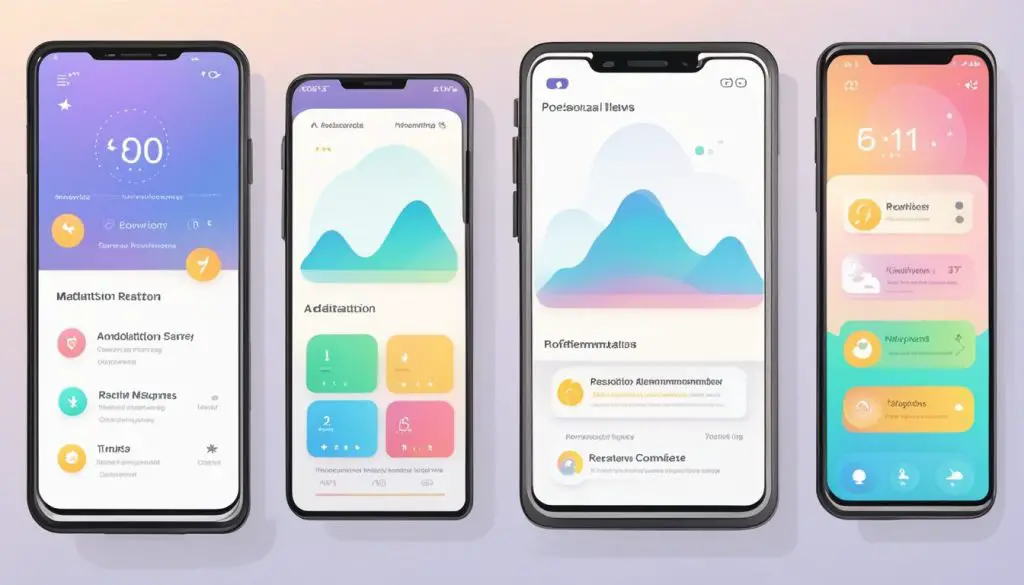Are Meditation Apps Worth It? Pros and Cons to Consider
Meditation apps have become increasingly popular in recent years, with a wide range of options available on the market. As someone who has been practising meditation for several years, I was curious to explore the effectiveness and benefits of these apps.
In this article, I will share my insights and experiences with meditation apps and answer the question, “Are meditation apps worth it?”

- Exploring Meditation Apps
Meditation apps are designed to help users meditate and achieve a state of mindfulness. They typically offer a range of features, such as guided meditations, breathing exercises, and sleep aids. Some apps also provide progress tracking, personalised recommendations, and social support.
- Benefits and Effectiveness
Research has shown that meditation can have a range of benefits, including reducing stress and anxiety, improving sleep quality, and enhancing emotional wellbeing. However, the effectiveness of meditation apps in achieving these benefits is still a topic of debate. Some users report significant improvements in their mental health and overall wellbeing, while others find the apps ineffective or even counterproductive.
Table of Contents
Exploring Meditation Apps
As someone who has been practicing meditation for a few years, I have been curious about the effectiveness of meditation apps. In this section, I will explore what meditation apps are, why they are so popular, and compare two of the top apps out there: Headspace and Calm.
Defining Meditation Apps
Meditation apps are digital tools that offer guided meditations, mindfulness exercises, and other features to help users develop a regular meditation practice. They are designed to make meditation more accessible and convenient for people who may not have the time or resources to attend in-person meditation classes.
Popularity of Meditation Apps
The popularity of meditation apps has exploded in recent years, with many people turning to these tools to help manage stress, anxiety, and other mental health issues. According to a study published in the Journal of Medical Internet Research, meditation apps can be effective in reducing stress and promoting psychological well-being.
Comparing Top Apps: Headspace and Calm
Two of the most popular meditation apps are Headspace and Calm. Both apps offer a range of guided meditations, mindfulness exercises, and other features to help users develop a regular meditation practice.
Headspace is known for its clean and simple interface, as well as its focus on teaching users the basics of meditation. The app offers a 10-day beginner’s course that introduces users to the fundamentals of mindfulness meditation.
Calm, on the other hand, is known for its soothing nature sounds and relaxing visuals. The app offers a wide range of guided meditations, including sessions on stress reduction, anxiety relief, and better sleep.
Overall, both apps have their strengths and weaknesses, and it ultimately comes down to personal preference. However, the important thing is to find an app that works for you and helps you develop a regular meditation practice.
Benefits and Effectiveness

As someone who has used meditation apps for a while, I can attest to their effectiveness in providing numerous benefits. Here are some of the benefits that I have personally experienced and that research has shown:
Mental Health and Stress Relief
One of the primary benefits of using meditation apps is the reduction of stress and anxiety. Many apps offer guided meditations that help you focus on your breath and be present in the moment, which can lower your stress levels and improve your mental health. In fact, research has shown that meditation can help reduce symptoms of depression and anxiety.
Improving Sleep Quality
Another benefit of using meditation apps is that they can help improve your sleep quality. Many apps offer guided meditations specifically designed to help you fall asleep faster and stay asleep longer. By practicing meditation before bed, you can calm your mind and body, making it easier to drift off into a restful sleep.
Meditation for Beginners
If you’re new to meditation, apps can be a great way to get started. Many apps offer beginner-friendly guided meditations that can help you learn the basics of meditation and develop a regular practice. By starting with just a few minutes a day, you can gradually increase your practice and experience the many benefits of meditation.
Overall, meditation apps can be a valuable tool for anyone looking to reduce stress, improve their mental health, and develop a regular meditation practice. With so many apps available, it’s important to find one that works for you and fits your needs.
Features and Content Analysis

When it comes to meditation apps, the features and content offered are crucial factors to consider. In this section, I will analyse the features and content of various meditation apps, including guided vs unguided meditations, additional resources and sessions, and user interface and experience.
Guided vs Unguided Meditations
Guided meditations are perfect for beginners who may be unsure of how to meditate or what to focus on during their meditation sessions. Most meditation apps offer a wide range of guided meditations with different lengths and themes. On the other hand, unguided meditations allow users to meditate in silence, without any guidance. This type of meditation is ideal for experienced meditators who prefer to meditate in silence.
Additional Resources and Sessions
Apart from guided and unguided meditations, most meditation apps offer additional resources and sessions. These resources may include nature sounds, sleep stories, and music tracks. Nature sounds are perfect for creating a calming and peaceful environment during meditation sessions. Sleep stories help users to relax and fall asleep, while music tracks can be used to enhance the meditation experience.
User Interface and Experience
The user interface and experience of a meditation app are crucial factors to consider. A good user interface should be easy to navigate, with clear instructions and guidance. The app should also be visually appealing, with calming colours and designs. The experience should be seamless, with no glitches or interruptions during meditation sessions.
In conclusion, the features and content of a meditation app are essential factors to consider when choosing a meditation app. Guided vs unguided meditations, additional resources and sessions, and user interface and experience are all crucial elements to consider when selecting a meditation app.
Cost and Accessibility

As someone who has tried several meditation apps, I understand the importance of finding one that fits your budget and accessibility needs. Here are some factors to consider when evaluating the cost and accessibility of meditation apps.
Free Trials and Subscriptions
Many meditation apps offer free trials, which can be a great way to test out the app and see if it’s a good fit for you. Some free trials last as little as a few days, while others can last up to a month or longer. It’s important to note that some apps require you to enter your credit card information to start a free trial, so be sure to read the fine print before signing up.
If you decide to continue using the app after the free trial, you’ll likely need to pay for a subscription. Subscription prices can vary widely, with some apps costing as little as a few pounds per month and others costing upwards of £100 per year. It’s important to evaluate the overall value of the app before committing to a subscription.
Evaluating Overall Value
When evaluating the overall value of a meditation app, it’s important to consider factors such as the quality and variety of meditations, the app’s user interface and design, and the level of customer support provided by the app’s developers.
Some apps offer a limited selection of free meditations, while others require a subscription to access all of the app’s content. It’s important to consider how often you plan to use the app and whether the subscription cost is worth it for the amount of content you’ll be able to access.
It’s also important to consider the app’s user interface and design. A well-designed app can make it easier and more enjoyable to use, while a poorly designed app can be frustrating and difficult to navigate.
Finally, it’s worth considering the level of customer support provided by the app’s developers. Some apps offer extensive customer support, including live chat and email support, while others provide little to no support beyond a basic FAQ section.
Overall, when evaluating the cost and accessibility of meditation apps, it’s important to consider factors such as free trials, subscription prices, overall value, and customer support. By taking the time to evaluate these factors, you can find a meditation app that fits your budget and accessibility needs.
User Reviews and Recommendations

Community Feedback
As someone who has been using meditation apps for a while, I have found that user reviews are a great way to get an idea of the app’s effectiveness. Many of the apps I have tried have a rating system, with users leaving comments about their experiences. I have found that this feedback can be very helpful in deciding which app to use.
One app that has received a lot of positive feedback is Headspace. Users have praised the app for its easy-to-follow guided meditations, and many have reported feeling more relaxed and focused after using it. Another app that has received positive reviews is Calm. Users have noted that the app’s soothing sounds and calming visuals have helped them to relax and unwind.
Of course, not all user reviews are positive. Some users have reported feeling that the guided meditations are too repetitive, or that the app doesn’t offer enough variety. It’s important to read a range of reviews before making a decision, and to keep in mind that everyone’s experience is different.
Expert Insights
In addition to user reviews, it’s also worth considering the recommendations of meditation experts. Many meditation apps have been developed in collaboration with experts in the field, and some even feature guided meditations led by well-known teachers.
One app that has received praise from experts is Ten Percent Happier Meditation. This app was developed in collaboration with meditation teacher Joseph Goldstein, and features guided meditations led by a range of teachers. Experts have noted that the app’s focus on mindfulness and self-awareness makes it a great choice for beginners.
Another app that has been recommended by experts is Smiling Mind. This app was developed in Australia, and features guided meditations designed specifically for children and young adults. Experts have praised the app for its accessibility and effectiveness, and many schools have even started using it in their classrooms.
In conclusion, user reviews and expert recommendations can be a great way to find a meditation app that works for you. By reading a range of reviews and considering the advice of experts, you can make an informed decision and find an app that helps you to relax, focus, and find peace of mind.
Frequently Asked Questions

What benefits do users typically experience with meditation apps?
Meditation apps can help users experience a variety of benefits, such as reducing stress, improving focus, and increasing overall well-being.
These benefits are often achieved through the use of guided meditations, which can help users learn meditation techniques and cultivate mindfulness.
Can meditation apps be an effective tool for managing anxiety?
Yes, meditation apps can be an effective tool for managing anxiety. Research has shown that regular meditation practice can help reduce symptoms of anxiety and improve overall mental health.
Many meditation apps offer guided meditations specifically designed to help users manage anxiety and stress.
How do free meditation apps compare to paid subscriptions?
While there are many high-quality free meditation apps available, paid subscriptions often offer additional features and content.
For example, some paid apps may offer more in-depth guided meditations, personalized meditation plans, or access to live meditation sessions with instructors.
Ultimately, the choice between free and paid apps will depend on individual preferences and needs.
What are some simple meditation techniques that apps can help with?
Meditation apps can help users learn a variety of simple meditation techniques, such as deep breathing, body scan meditation, and visualization.
These techniques can be used to reduce stress, improve focus, and promote relaxation.
Which meditation app has been highly recommended by users in 2024?
According to user reviews, the Headspace app has been highly recommended in 2024.
The app offers a wide range of guided meditations, as well as personalized meditation plans and mindfulness exercises.
Are there any drawbacks to using apps for meditation practices?
While meditation apps can be a useful tool for cultivating mindfulness and reducing stress, there are some potential drawbacks to consider.
For example, some users may find it difficult to stay motivated or consistent with their meditation practice when using an app.
Additionally, relying too heavily on an app for meditation practice may prevent users from fully developing their own meditation skills and techniques.







